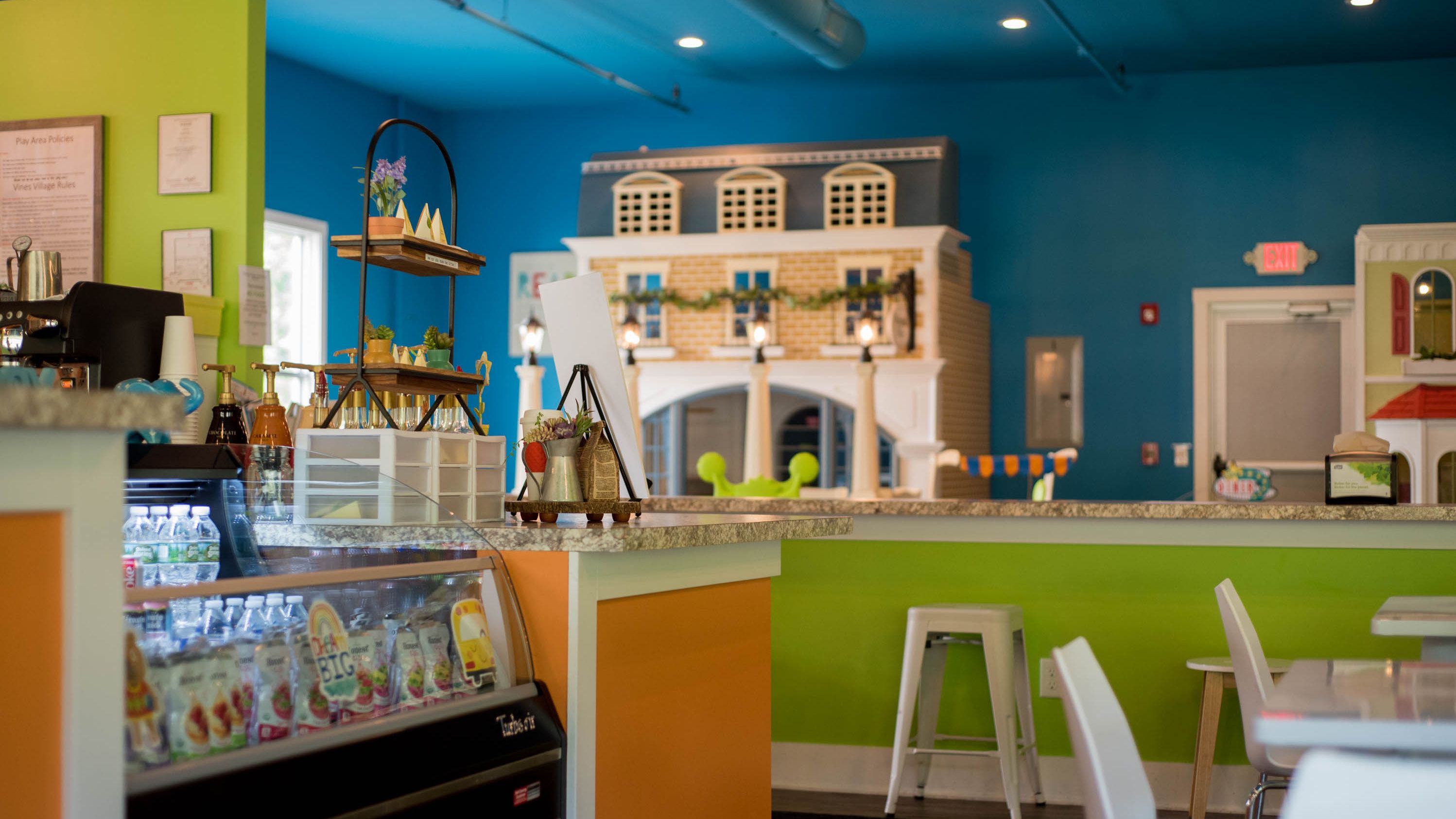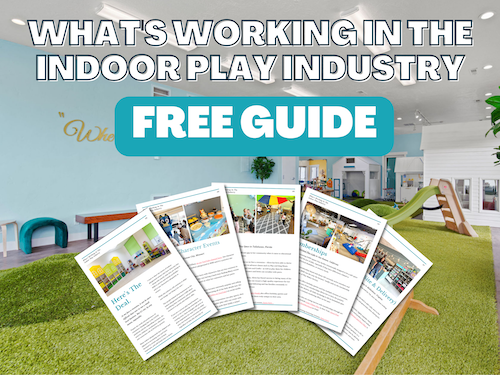Read This BEFORE Joining A Play Cafe Franchise Program (Hidden Risks and Pitfalls)

The Hidden Risks of Buying Into a Play Café Franchise
For many aspiring indoor-playground owners, buying into a play café or children’s activity franchise seems like the safest route. On paper, it promises a ready-made brand, a proven business plan, and an experienced team guiding your every step. But in reality—especially in the indoor-play and play-café space—franchising is often a financial and emotional trap disguised as a shortcut.
As someone who’s coached and consulted hundreds of play-based business owners through Play Café Academy and Play Maker Society, I’ve seen how often the franchise model backfires in this industry. Over half of my one-on-one consulting clients today are actively trying to escape franchise or partnership agreements that have left them overworked, over-budget, and under-supported.
This article isn’t about negativity—it’s about empowerment. Because what I see most frequently is hopeful entrepreneurs signing on the dotted line without realizing that the “support” they’ve been promised may be superficial at best, and destructive at worst.
The Instagram Illusion
Social media makes many franchises look wholesome, turnkey, and family-friendly. Their feeds show colorful play structures, cheerful baristas, and packed birthday parties. But those polished photos rarely tell the whole story. Behind the scenes, many franchisors have overextended themselves—growing faster than their systems, chasing new franchisee fees instead of strengthening their current locations.
This “growth for growth’s sake” approach is one of the biggest red flags you can spot during your research. When a franchisor uses new franchise fees to patch its own cash-flow problems, it’s not building a solid foundation—it’s building a house of cards.
The result? Franchisees become a source of quick capital, not long-term partners. The franchisor’s success depends on selling more franchises, not on helping yours succeed.
Bottom line: the fees will cripple you, the brand rules will handcuff you, and the only consistent winner will be the franchisor.
Why Large National Chains Can Make Franchising Work
Let’s start with some fairness: franchising can work. It works beautifully for mature national chains with massive resources and brand equity—companies like The Little Gym, Goldfish Swim School, or Sky Zone.
When a parent sees one of those brands open in their neighborhood, they already know exactly what to expect. That instant trust shortens the path to profitability. These companies also have:
-
Dedicated national marketing budgets worth millions per year.
-
Purchasing power that drastically reduces equipment, insurance, and supply costs.
-
Full-time corporate field teams who support openings and ongoing operations.
-
Refined systems proven across dozens—or hundreds—of markets.
In short, their franchisees benefit from economies of scale that small play-café concepts simply can’t match.
Now, contrast that with a franchisor that has only two or three open locations—maybe one is corporate-owned and the others are still under construction. That’s not a “proven system.” That’s a startup asking you to pay for its experimentation.
Never become someone else’s guinea pig. If a franchisor hasn’t demonstrated long-term profitability across multiple markets and seasons, you’re taking on their risk—without the upside.
The Local Market Mismatch
Indoor play thrives on localization. What families in a Chicago suburb want is very different from what families in southern California or rural Tennessee want. A rigid, one-size-fits-all franchise model doesn’t allow for those nuances.
Take climate alone: in warm regions, open play can stay steady year-round; in colder areas, business is highly seasonal. In places where winters stretch six months, summer sales can drop by 70% or more as families head outdoors.
A corporate system dictating your hours, pricing, or programming won’t account for that.
One of my former clients, “Emily,” learned this the hard way. She bought into a California-based play café franchise that relied on short, high-volume visits—families popping in for 45 minutes, grabbing a latte, and leaving. In her Midwestern town, parents wanted a slower, cozy experience: lingering over breakfast, ordering lunch, and staying all morning.
She asked corporate for permission to extend play sessions, reconfigure her seating, and adjust her menu. They denied every request. Within 18 months, she closed—deep in debt and emotionally drained. She told me later it was worse than her old corporate job because at least there she got a paycheck; under her franchise agreement, she was working around the clock and still losing money.
In this business, money loves speed and agility. When you lose the ability to pivot quickly—whether it’s launching a new class, changing your hours, or responding to local demand—you lose your biggest competitive advantage.
Two Businesses, One Overwhelmed Owner
Running a play café means managing two distinct, heavily regulated operations:
-
A children’s play facility with insurance, safety, and sanitation standards; and
-
A food-service business under health-department oversight.
Each side has its own compliance headaches—permits, inspections, employee training, and equipment maintenance. Yet many franchisors have deep experience in neither.
I’ve heard countless stories of franchisees calling corporate in panic after failing a health inspection or getting flagged for fire-code issues, only to be told, “That’s a local matter—check with your contractor.” That’s not support; that’s abandonment.
If a franchisor is actively selling new territories but can’t provide expertise in kitchen layout, fire suppression, ADA accessibility, or health-department compliance, you’re essentially paying royalties for advice you’ll need to find elsewhere anyway.
The Cost Problem
Even as an independent owner, opening a play café is a major investment—typically $250,000 to $500,000. Add a $40,000–$60,000 franchise fee, ongoing 6–8% royalties, and 1–3% marketing fees on top of that, and your profit margin shrinks dramatically.
For example:
-
Annual sales: $400,000
-
Royalties + marketing fund (8%): $32,000
-
Rent, labor, insurance, supplies: another 60–70% of revenue
That leaves roughly 10–12% net profit—before loan payments or owner salary. For many franchisees, this means taking home less than $3,000 a month while working 50–60 hours per week.
Because royalties are based on gross revenue, franchisors make money even if you don’t.
And don’t expect them to handle your advertising. In many cases, corporate focuses its marketing on recruiting new franchisees rather than helping local owners drive traffic. And even if they SAY they will help you with advertising- they will not have their finger on the pulse of your local market and customers enough to be actually effective in generating sales.
Build-Out Nightmares
Franchise brochures often promise “average build-out costs” of $150,000–$200,000, assuming a brand-new retail shell. But most tenants lease existing spaces with outdated plumbing, insufficient sprinklers, or missing accessibility features.
One Play Maker Society member signed a franchise agreement for a charming downtown space. Corporate’s estimate was $180,000. By the time her city required sprinklers, a second egress, ADA-compliant restrooms, and a Type-1 hood system, the final cost exceeded $330,000. When she asked corporate for help, they simply replied, “That’s part of your local permitting process.”
Franchisors get their fees whether or not your build-out stays on budget. You’re the one absorbing the overruns.
The Hidden Handcuffs
Once your doors open, restrictions multiply. Many franchisees quickly discover they’ve traded freedom for frustration:
-
Want to add a new event or partnership? Approval required.
-
Want to serve local bakery items instead of national suppliers? Denied.
-
Want to host a vendor market or birthday-party collaboration? “Off-brand.”
One Florida owner wanted to add toddler drop-off camps to offset slow winter months. She had qualified staff, insurance coverage, and overwhelming customer demand—over 60 families on a waitlist. The franchisor refused, citing liability concerns. She lost thousands in revenue and credibility with her customers.
That’s the hidden cost of franchising: missed opportunities. A franchise agreement can prevent you from adapting to community partnerships, local sponsorships, or creative revenue streams that could transform your bottom line.
Marketing and Technology Bottlenecks
Corporate technology and marketing systems sound helpful—until you realize they’re outdated, restrictive, and misaligned with your market.
Franchisees are often required to use specific POS systems, booking software, and websites. These may not integrate with modern CRM or email-marketing tools, creating operational friction.
Even worse, corporate marketing calendars rarely align with local conditions. You may be required to promote “Summer Camp Registration” in May when your local schools don’t let out until late June, or “Spring Specials” when your city is still snowed in.
Independent owners can pivot instantly. They can post a “Snow Day Play Sale” on Instagram at 8 a.m. and fill the building by 10. Franchisees? They often need to submit graphics for approval first. In a fast-moving, seasonal industry, that loss of agility is fatal.
The Fine Print You Must Read
Before signing anything, hire a franchise attorney to review the Franchise Disclosure Document (FDD). Pay special attention to:
-
Item 7: Are build-out and permitting contingencies realistically estimated?
-
Item 12: How large and protected is your territory?
-
Item 17: What happens if you want to sell or terminate? Are personal guarantees still binding?
-
Item 19: Are financial performance claims based on actual store data, and do they include labor, rent, and owner salary?
Don’t just talk to current franchisees—talk to former ones. Ask why they left, how long it took to break even, and whether corporate support matched what was promised.
Also, join owner forums and Facebook groups where real discussions happen unfiltered. You’ll learn far more there than you ever will from a franchise sales rep.
When Franchising Might Make Sense
To be clear, there are exceptions. Franchising can work when the brand has proven profitability, true name recognition, and the scale to provide meaningful infrastructure. Systems like KidStrong or My Gym often meet those standards, offering national advertising, robust training, and hands-on field support.
I also love The Bunny Hive-- a franchisor who has really carved out a unique niche and created curriculums proprietary enough to truly benefit the franchisee.
But unless the opportunity you’re evaluating operates at that level of maturity, signing on is an enormous risk.
Smarter, More Flexible Alternatives
If you crave structure and proven systems but don’t want to lose control, you have better options.
-
Independent Ownership with Frameworks: Use established SOPs, templates, and mentorship through programs like Play Café Academy or Play Maker Society to launch confidently without royalties.
-
Licensing Models: Gain access to branding or curriculum elements without surrendering operational autonomy.
-
Acquire an Existing Independent Play Café: You’ll inherit staff, customers, and compliant build-outs, then optimize under your own brand.
-
Strategic Local Partnerships: Collaborate with co-working collectives, music teachers, or local sponsors to expand your offerings—no corporate approval required.
These paths preserve your creative freedom and allow you to build a business truly aligned with your market.
The Bottom Line
Franchising isn’t inherently bad—but in the children’s play-café sector, it’s rarely a good fit. It’s a system designed for scale, not for community-based creativity or agility.
Before signing a franchise agreement, ask yourself: Will this franchise make me more money than it costs me—not just in fees, but in lost control and missed opportunities?
If you can’t answer “yes” confidently, walk away. You can absolutely build a profitable, scalable play café without a corporate name above your door. In fact, the most successful owners I’ve ever met did exactly that—building strong, authentic brands rooted in their own communities, not someone else’s blueprint.



